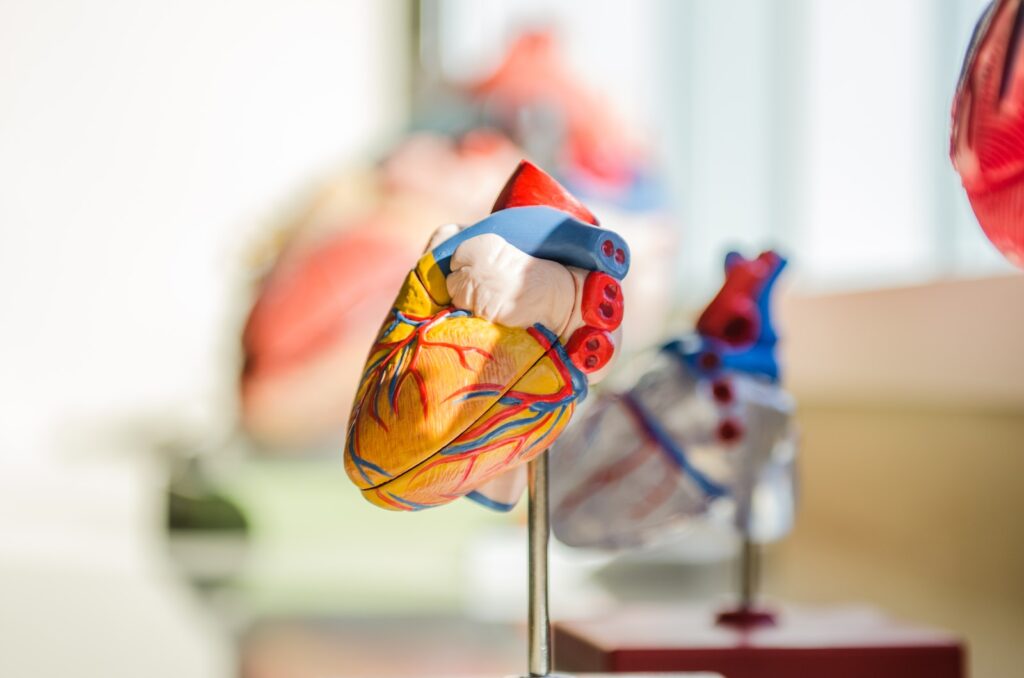Table of Contents
Introduction: Understanding Heart Disease and Its Prevalence
Heart disease, also known as cardiovascular disease, is a common health problem that affects millions of people worldwide. It can refer to any condition that affects the heart’s ability to function correctly, including problems with the valves, arteries, or veins.
The leading cause of death globally is heart disease. According to recent statistics from the World Health Organization (WHO), approximately 17.9 million deaths are due to cardiovascular disease each year – accounting for over one-third of all global deaths.
The risk factors for developing heart disease are varied and complex; some cannot be controlled (e.g., age and genetics) while others are modifiable through lifestyle changes (e.g., smoking cessation and diet). Hypertension, high cholesterol levels, obesity or being overweight diabetes mellitus derived diseases like type II Diabetes Mellitus could become major risks for having this illness.
To combat these rising numbers of cardiovascular ailments around the world increasing research efforts have been directed towards understanding its causes in order to develop effective preventive measures and treatments.
Advances in Cardiovascular Imaging Technologies: Improving Early Diagnosis
The early detection of cardiovascular disease is crucial to ensuring that patients receive prompt treatment and are able to lead healthier lives. Recent advances in cardiovascular imaging technologies have greatly improved our ability to identify heart conditions earlier, and with greater accuracy.
One such technology is coronary computed tomography angiography (CCTA), which uses X-rays and powerful computers to create detailed images of the heart’s blood vessels. This imaging technique enables physicians to assess whether a patient has any blockages or plaque buildup in their arteries, which can be an indicator of impending heart attack or stroke. Moreover, CCTA has shown higher diagnostic accuracy than traditional stress tests.
Magnetic resonance imaging (MRI) is another advanced technology that provides highly accurate images of the body’s organs, including the heart. MRI machines use strong magnetic fields and radio waves rather than X-rays for safer results. Cardiac MRI allows cardiologists not only see structural problems like narrowed blood vessels or valve issues but also functional information about how much blood your ventricles pump with each beat
In addition to these non-invasive techniques, there are also invasive approaches that allow doctors to visualize inside your veins without making large incisions called cardiac catheterization With this approach they insert a thin tube up through your groin into one of your arteries then thread it up toward your neck where they can dye injected under x-ray guidance
A lot progress had been achieved yet more improvement are still required as these modality’s cost may limit accessibilitiesGenomics Research: Uncovering the Genetic Roots of Heart Disease
Heart disease is a complex condition with multiple contributing factors, including lifestyle choices and genetic makeup. In recent years, genomics research has made significant strides in identifying specific genes that may play a role in the development of heart disease.
The Human Genome Project was completed in 2003, which mapped out all the human genome’s DNA sequence. This achievement paved the way for new discoveries about how genetics plays into various medical conditions such as heart disease.
In one study published by researchers at Harvard Medical School and Brigham and Women’s Hospital, scientists used genomic data to develop an algorithm capable of predicting individuals’ risk for developing coronary artery disease (CAD). The algorithm incorporated several genetic variants associated with CAD alongside traditional risk factors such as cholesterol levels and blood pressure readings.
Furthermore, other studies have focused on gene editing therapies that can be used to modify or change problematic genes responsible for some forms of inheritable cardiovascular diseases. These treatments are being seen as potential cures rather than just management strategies- however still very preliminary
While this research is still ongoing and not yet conclusive enough to directly impact clinical practices regarding patients’ health care decisions related to their heart health status – it could possibly provide further insights into creating personalized treatment options catered towards certain individuals according to their unique genetic profile. However these developments would require greater scientific understanding before they are translated into actual real-world applications but have promising results thus far
“Overall Genomic medicine will largely transform patient healthcare experience from reactive problem-based care models into preventative medicine”- said Dr Mark Caulfield Chief Scientist at Genomics England It remains clear that Genetics research in relation specifically-tailored precision medicine approaches holds much promise for the future of medical care.”
Innovative Therapeutic Approaches for Managing Advanced Heart Failure
Cardiac resynchronization therapy (CRT) is one such approach that has emerged as an effective treatment option for select patients with severe heart failure. This technique involves implanting a special device called a CRT pacemaker or defibrillator, which helps to synchronize the heartbeat and improve the overall pumping efficiency of the heart.
Another promising approach is mechanical circulatory support (MCS), which involves implanting devices such as left ventricular assist devices (LVADs) or total artificial hearts (TAHs). These devices help to support the failing heart’s function and provide improved blood flow throughout the body. MCS can be used either as a temporary measure until the patient’s condition stabilizes or as a long-term solution for those who are not candidates for transplantation.
Advanced pharmacotherapy also plays a crucial role in managing heart failure. Newer drugs such as sacubitril/valsartan have been shown to significantly reduce hospitalizations and mortality rates in some patients with advanced heart failure by inhibiting certain neurohormonal pathways involved in disease progression.
In addition, stem cell therapies represent another rapidly evolving field with significant potential for treating advanced heart disease. Stem cells derived from bone marrow, adipose tissue or umbilical cord blood may be used to regenerate damaged cardiac tissue and improve overall myocardial function in selected patients with severe refractory symptoms despite conventional therapies.
The ultimate goal of these innovative therapeutic approaches is to restore normal cardiac function, prolong survival, prevent hospitalizations and improve overall quality of life for patients with advanced heart failure. If you or a loved one has been diagnosed with heart failure, talk to your healthcare provider about the latest options available and which one may be best suited for your particular needs.
The Role of Lifestyle Changes in Preventing and Treating Heart Disease
Heart disease is the leading cause of death worldwide, but the good news is that it can be prevented and managed through lifestyle changes.
A healthy lifestyle involves eating a well-balanced diet low in saturated fat, cholesterol, and salt while high in fiber-rich fruits and vegetables. Reducing alcohol consumption, quitting smoking cigarettes or tobacco products is also crucial for maintaining heart health.
In addition to a proper diet, physical activity also plays an important role in preventing heart disease. Experts recommend exercising at least thirty minutes most days of the week or engaging in moderate-intensity activities like brisk walking, jogging or cycling as they improve cardiovascular fitness.
Managing stress levels is another critical factor when it comes to maintaining heart health. Stress has been linked to several risk factors associated with coronary artery disease such as high blood pressure, inflammation and abnormal heartbeat patterns among others.
To help prevent these risks from becoming too severe individuals should do things that reduce stress levels such as meditation practice or other relaxation techniques.
In conclusion, adopting certain lifestyle choices can greatly reduce one’s chances of developing heart diseases; however early detection and treatment are equally important aspects to consider once someone has been diagnosed with any form of cardiac issues. Small daily habits can have significant long-term benefits on your overall health so choose better nutrition options for yourself today!
Promising Future Directions in Cardiovascular Research
Cardiovascular disease is one of the leading causes of death worldwide. Fortunately, there have been remarkable breakthroughs in cardiovascular research in recent years that bring new hope to those who suffer from heart diseases. Researchers are exploring several innovative directions that could transform the future of cardiovascular care and treatment.
1) Gene Editing
The ability to modify genes has opened up incredible possibilities for preventing or curing genetic heart problems. Scientists can edit human genes using a revolutionary technique called CRISPR/Cas9, allowing them to correct gene mutations responsible for inherited cardiac disorders such as hypertrophic cardiomyopathy, arrhythmogenic right ventricular dysplasia and familial hypercholesterolemia. While still being researched, these advances hold great promise for correcting DNA-related issues linked with cardiovascular health.
2) Artificial Intelligence (AI)
The healthcare industry is increasingly adopting AI technologies to improve diagnostic accuracy, early detection and treatment of conditions including heart disease; by analyzing vast amounts of patient data – including medical records and imaging studies – specialized algorithms generate predictive patterns that physicians then use to inform their clinical decision-making process accordingly.
“AI-powered analyses may help detect patterns found within patients’ measurements which were otherwise impossible for humans” suggests Dr. Eduardo Marban at Cedars-Sinai Heart Institute; “the integration of machine learning algorithms into cardiology practice provides clinicians with an invaluable resource when it comes down diagnosing complex cases”.
In the coming years we can expect more significant developments through AI technology enabling earlier diagnoses thanks to higher accuracy rates gained over time.




